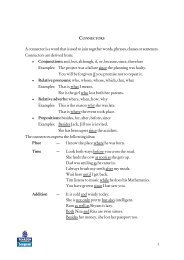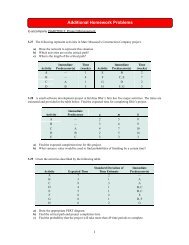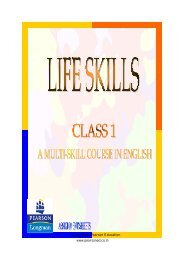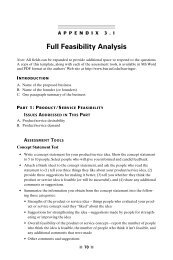A pronoun is a word used in place of a noun so that we do ... - Pearson
A pronoun is a word used in place of a noun so that we do ... - Pearson
A pronoun is a word used in place of a noun so that we do ... - Pearson
You also want an ePaper? Increase the reach of your titles
YUMPU automatically turns print PDFs into web optimized ePapers that Google loves.
PRONOUNS<br />
A <strong>pro<strong>noun</strong></strong> <strong>is</strong> a <strong>word</strong> <strong>used</strong> <strong>in</strong> <strong>place</strong> <strong>of</strong> a <strong>noun</strong> <strong>so</strong> <strong>that</strong> <strong>we</strong> <strong>do</strong> not have to repeat <strong>that</strong><br />
<strong>noun</strong>.<br />
For example, <strong>we</strong> <strong>do</strong> not say:<br />
Rohit and Rima <strong>we</strong>re hungry. Rohit and Rima wanted to order a pizza. But Rohit<br />
and Rima’s mother did not let Rohit and Rima order a pizza. Instead Rohit and<br />
Rima’s mother made a pizza at home.<br />
Instead, <strong>we</strong> say:<br />
Rohit and Rima <strong>we</strong>re hungry. They wanted to order a pizza. But their mother did<br />
not let them order it. Instead she herself made one.<br />
Pro<strong>noun</strong>s have s<strong>in</strong>gular and plural numbers just like <strong>noun</strong>s.<br />
Examples: I—<strong>we</strong>, m<strong>in</strong>e—ours, myself—ourselves, etc<br />
Pro<strong>noun</strong>s are classified as follows:<br />
• Per<strong>so</strong>nal <strong>pro<strong>noun</strong></strong>s are <strong>used</strong> <strong>in</strong> <strong>place</strong> <strong>of</strong> the names <strong>of</strong> per<strong>so</strong>ns or th<strong>in</strong>gs. Some<br />
per<strong>so</strong>nal <strong>pro<strong>noun</strong></strong>s are I, <strong>we</strong>, me, us, she, her, he, him, you, it, they, them.<br />
Examples: I <strong>we</strong>nt to the party.<br />
They gave him the gift.<br />
First per<strong>so</strong>n refers to the per<strong>so</strong>n who <strong>is</strong> speak<strong>in</strong>g.<br />
Examples: I, me, <strong>we</strong>, us<br />
Second per<strong>so</strong>n refers to the per<strong>so</strong>n be<strong>in</strong>g spoken to.<br />
Examples: you (you <strong>is</strong> <strong>used</strong> both <strong>in</strong> the s<strong>in</strong>gular and <strong>in</strong> the plural)<br />
Third per<strong>so</strong>n refers to the per<strong>so</strong>n or th<strong>in</strong>g be<strong>in</strong>g spoken about.<br />
Examples: he, him, she, her, it, they, them<br />
• Demonstrative <strong>pro<strong>noun</strong></strong>s are <strong>used</strong> to po<strong>in</strong>t out or <strong>in</strong>dicate the objects which<br />
<strong>we</strong> are referr<strong>in</strong>g to. Some demonstrative <strong>pro<strong>noun</strong></strong>s are th<strong>is</strong>, <strong>that</strong>, these, those.<br />
Examples: Th<strong>is</strong> <strong>is</strong> the book I wanted.<br />
These roses are beautiful.<br />
• Interrogative <strong>pro<strong>noun</strong></strong>s are <strong>used</strong> when <strong>we</strong> ask questions. Some <strong>in</strong>terrogative<br />
<strong>pro<strong>noun</strong></strong>s are whom, whose, who, what, which.<br />
Examples: To whom <strong>is</strong> the letter addressed?<br />
Which house <strong>do</strong> you mean?<br />
1
• Reflexive <strong>pro<strong>noun</strong></strong>s are <strong>used</strong> as an object <strong>in</strong> a sentence, and they refer to the<br />
<strong>noun</strong> which <strong>is</strong> the subject <strong>in</strong> <strong>that</strong> sentence.<br />
Examples: You should give yourself <strong>so</strong>me time to adjust to the new rout<strong>in</strong>e.<br />
I want to <strong>do</strong> it myself <strong>so</strong> <strong>that</strong> I learn it.<br />
• Emphas<strong>is</strong><strong>in</strong>g <strong>pro<strong>noun</strong></strong>s are <strong>used</strong> to emphas<strong>is</strong>e or strengthen the position <strong>of</strong> the<br />
subject <strong>in</strong> <strong>that</strong> sentence.<br />
Examples: I myself spoke to her.<br />
She herself was present there.<br />
• Possessive <strong>pro<strong>noun</strong></strong>s are <strong>used</strong> to show possession or belong<strong>in</strong>g. Some possessive<br />
<strong>pro<strong>noun</strong></strong>s are my, m<strong>in</strong>e, your, yours, h<strong>is</strong>, hers, its, ours, their, theirs.<br />
Examples: That <strong>is</strong> h<strong>is</strong> car.<br />
Th<strong>is</strong> <strong>is</strong> my bag.<br />
• Indef<strong>in</strong>ite <strong>pro<strong>noun</strong></strong>s are <strong>used</strong> <strong>in</strong> <strong>place</strong> <strong>of</strong> <strong>noun</strong>s, but they <strong>do</strong> not refer to any<br />
particular per<strong>so</strong>n or th<strong>in</strong>g. Some <strong>in</strong>def<strong>in</strong>ite <strong>pro<strong>noun</strong></strong>s are everyone, everybody,<br />
<strong>so</strong>meone, <strong>so</strong>meth<strong>in</strong>g, anybody, nobody, one, none.<br />
Examples: Everyone <strong>is</strong> watch<strong>in</strong>g the movie.<br />
No one was at home.<br />
• Relative <strong>pro<strong>noun</strong></strong>s are <strong>used</strong> to relate a <strong>noun</strong> to the group <strong>of</strong> <strong>word</strong>s <strong>that</strong> follow<br />
it. They are <strong>used</strong> as connectors. Some relative <strong>pro<strong>noun</strong></strong>s are who, whose, whom,<br />
which, <strong>that</strong>.<br />
Examples: She <strong>is</strong> the one who <strong>is</strong> responsible.<br />
The novel <strong>that</strong> I am read<strong>in</strong>g <strong>is</strong> a thriller.<br />
• D<strong>is</strong>tributive <strong>pro<strong>noun</strong></strong>s are <strong>used</strong> to refer to specific choices out <strong>of</strong> a given array<br />
<strong>of</strong> objects. So they are always <strong>in</strong> the s<strong>in</strong>gular. Some such <strong>pro<strong>noun</strong></strong>s are each,<br />
every, either, neither.<br />
Examples: Each <strong>of</strong> the boys <strong>is</strong> present.<br />
Neither she nor he has rested.<br />
2
WORKSHEET 2<br />
I. Pick out the <strong>pro<strong>noun</strong></strong>s <strong>in</strong> the follow<strong>in</strong>g sentences.<br />
a) She <strong>is</strong> watch<strong>in</strong>g telev<strong>is</strong>ion.<br />
b) They are go<strong>in</strong>g to the movies today.<br />
c) I am study<strong>in</strong>g grammar.<br />
d) Do you know the ans<strong>we</strong>r?<br />
e) You yourself must f<strong>in</strong>d a <strong>so</strong>lution to th<strong>is</strong> problem.<br />
f) Every child must go to school.<br />
g) God has been k<strong>in</strong>d to me.<br />
h) The guests enjoyed themselves.<br />
i) Th<strong>is</strong> <strong>is</strong> the architect who designed my house.<br />
j) I could not open the email which you sent me.<br />
II. Fill <strong>in</strong> the blanks with the appropriate <strong>pro<strong>noun</strong></strong>s from the box.<br />
each myself none which yourself<br />
where many their th<strong>is</strong> whoever<br />
a) __________ <strong>is</strong> the house where I live.<br />
b) I __________ will speak to him.<br />
c) You can <strong>do</strong> th<strong>is</strong> work __________.<br />
d) The children are hav<strong>in</strong>g __________ d<strong>in</strong>ner.<br />
e) __________ <strong>of</strong> these cards <strong>do</strong> you like?<br />
f) __________ <strong>of</strong> the passengers was searched.<br />
g) __________ <strong>of</strong> the sickly puppies <strong>we</strong>re able to survive the w<strong>in</strong>ter.<br />
h) __________ <strong>is</strong> your father?<br />
i) __________ <strong>we</strong>re <strong>in</strong>vited to the lunch.<br />
j) __________ broke my pen will have to re<strong>place</strong> it.<br />
3


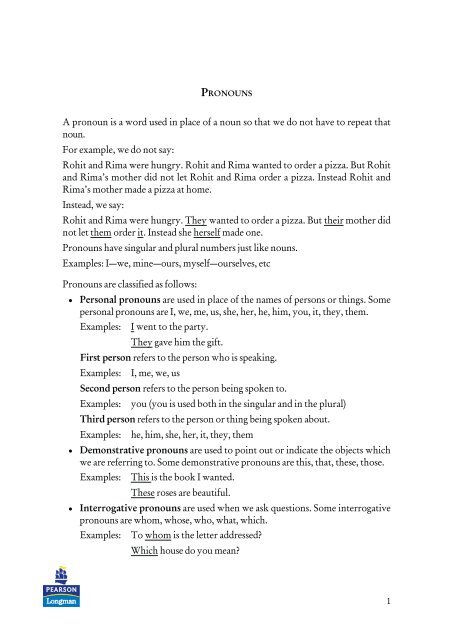
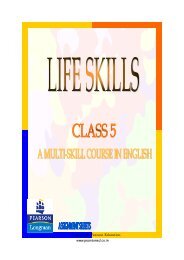
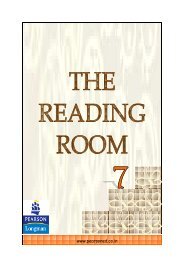
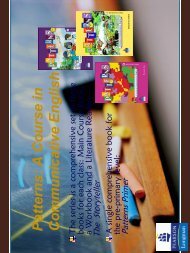
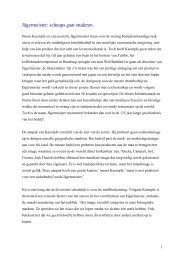
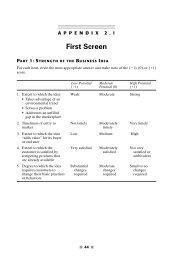

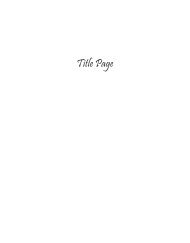


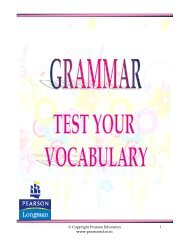
![[Productnaam] Marketingplan - Pearson](https://img.yumpu.com/26285712/1/190x132/productnaam-marketingplan-pearson.jpg?quality=85)
